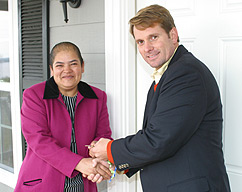ANOTHER VIEW: ‘Jesus’ celebrates 25th birthday_120604
Posted: 12/03/04
ANOTHER VIEW:
'Jesus' celebrates 25th birthday
Recently I participated with other volunteers in distributing the gospel on the streets of a sprawling mega-city in Central Asia.
We struck up conversations with shopkeepers, cafe owners, college students, bus passengers and anyone else willing to talk to us in the overwhelmingly Muslim city. We prayed for opportunities to give our new acquaintances small packets containing a New Testament, a video showing local followers of Christ and how they worship–and a DVD version of the “Jesus” film.
Not everyone took our gift. Some declined politely; a few returned it after looking it over. But many accepted it with curiosity, gratitude, even emotion. They seemed eager to read, hear and see all they could about Jesus. Several asked for extra packets.
Almost anywhere you find the gospel–and people hungry for it–you'll find “Jesus.”
It's by far the most-watched and most-translated movie in history. It's also one of the church's most potent evangelism tools. The film, which first appeared in theaters in 1979, is marking the 25th year of its amazing run. The Jesus Film Project, an arm of Campus Crusade for Christ, distributes various versions worldwide. A few “Jesus” statistics (updated just this fall) will give you a feel for its global reach:
Cumulative viewing/listening audience (includes multiple viewings) since 1979: more than 5.8 billion.
![]() Languages with “Jesus” film/audio translations: 874, with 229 more in the works.
Languages with “Jesus” film/audio translations: 874, with 229 more in the works.
![]() Countries where the film has been shown: 228.
Countries where the film has been shown: 228.
![]() Countries where the film has been broadcast on television: 176.
Countries where the film has been broadcast on television: 176.
![]() “Jesus” film prints, videocassettes, DVDs and VCDs in circulation: more than 510 million.
“Jesus” film prints, videocassettes, DVDs and VCDs in circulation: more than 510 million.
![]() Personal decisions to follow Christ at public film showings: more than 197 million.
Personal decisions to follow Christ at public film showings: more than 197 million.
There's no slowing down on the horizon. In addition to its availability in tailored versions for various formats and age groups, “Jesus” just made its Internet debut. In October, the entire film became accessible online–in more than 300 languages–via streaming video at www.JesusFilm.org.
“To our knowledge, a film has never been freely available on the Internet in so many different languages,” says Jim Green, who directs The Jesus Film Project. “The 300-plus translations available represent the heart language of more than 90 percent of the world's population.”
What is the continuing power of this movie? When people see “Jesus,” they see Jesus–and understand his words–often for the first time.
“Jesus speaks our language!” one elderly woman in Mozambique joyously cried after seeing the first showing of “Jesus” in her Makhuwa language. International Mission Board missionaries spearheaded the Makhuwa version of the film and saw thousands come to Christ among the 5-million-member animistic people group.
The emotional impact of witnessing Jesus' life and death–particularly his crucifixion–also explains the film's appeal. In many places, audiences weep, tear their clothes and toss dirt in the air to express grief, throw sticks at the Roman soldiers beating Jesus on the screen–or sit in silent awe.
Perhaps the true source of the film's power, however, is this: It conveys the word of God, specifically the Gospel of Luke, with virtually word-for-word faithfulness.
A recent campaign in Tomsk, Siberia, drew thousands of people to screenings around the city. Theaters overflowed, and 150 people who were turned away from one cinema walked more than a mile in the cold to see the movie at another location.
“I'm tired of thrillers,” one of the viewers said. “I want something that will talk to my heart. It's time to believe in God.”
So great is the film's impact that International Mission Board mission strategists include its availability as one of their measures of the evangelization of a people group. The Jesus Film Project has formally partnered with the IMB since 1997. Southern Baptist mission teams remain the top users of the film worldwide–and they continue to find new and more effective ways to utilize it.
As missionaries “continue to push into people groups that have little literacy and no Bible knowledge, it's requiring them to re-think using the 'Jesus' film,” media strategist Mark Snowden notes. “In many places, they delay showing the film until basic concepts of God, sin and redemption are understood by the people. Otherwise, in places where ancestors or other gods are worshipped, the people will just add Jesus to their pantheon of gods.”
When those concepts are effectively communicated first, the film is increasingly becoming “a discipleship tool for new believers,” Snowden adds. “They view Jesus' life and readily identify with the disciples who are seeking to follow Jesus.”
Happy 25th birthday, “Jesus.” May your influence increase!
Erich Bridges is a senior writer at the Southern Baptist International Mission Board in Richmond, Va. His column is distributed by Baptist Press.



